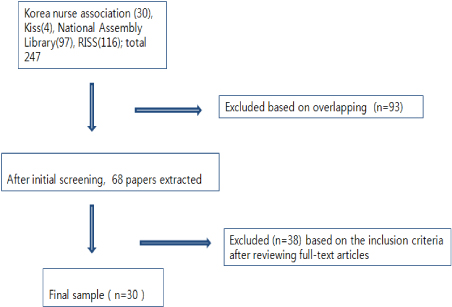J Korean Acad Nurs Adm.
2011 Dec;17(4):538-550.
A Review of Research on Hospital Nurses' Turnover Intention
- Affiliations
-
- 1Department of Nursing, Dankook University, Korea.
- 2Department of Nursing, Woosong University, Korea. navykmj@naver.com
Abstract
- PURPOSE
The purpose of this study was to review articles, thesis and dissertation on turnover intention of hospital nurses in order to identify overall trends in turnover intention of nurses and suggest strategies for reducing turnover intention. METHOD: Thirty research papers on turnover intention of nurses were reviewed. RESULT: These papers were journal articles and thesis regarding nurses who worked in general wards, intensive nursing units, and emergency rooms in hospital. The tools used to measure turnover intention were Lawler (1983), Mobley (1982), and Lee (1995), and others. Most of tools were composed of 1-11 items, with 4-7 point Likert scales. Reported reliability was .55 to .91. The mean score for turnover intention was between 2.40 and 3.85. The important results revealed that job satisfaction, organizational commitment, and stress affected turnover intention of hospital nurses.
CONCLUSION
The findings from this review indicate that to reduce turnover intention for hospital nurses, a nurse manager should increase job satisfaction, organizational commitment, and reduce stress by developing a good culture and work climate. Moreover it is necessary to assess stress and job satisfaction of nurses, and to manage nurses' welfare, including night duty policy, salary, and career ladder.
Keyword
MeSH Terms
Figure
Reference
-
1. Cavanagh SJ, Coffin DA. Staff turnover among hospital nurses. J Adv Nurs. 1992. 17(11):1369–1376.
Article2. Choi J, Ha NS. The effects of clinical nurse's internal marketing on job satisfaction, turnover intention, and customer orientation. J Korean Acad Nurs Adm. 2007. 13(2):231–241.3. Coomber B, Barriball KL. Impact of job satisfaction components on intent to leave and turnover for hospital-based nurses: a review of the research literature. Int J Nurs Stud. 2007. 44(2):297–314.
Article4. Curry JP, Wakefield DS, Price JL, Mueller CW, McCloskey JC. Determinants of turnover among nursing department employees. Res Nurs Health. 1985. 8(4):397–411.
Article5. Hayes LJ, O'Brien-Pallas L, Duffield C, Shamian J, Buchan J, Hughes F, et al. Nurse turnover: a literature review. Int J Nurs Stud. 2006. 43(2):237–263.
Article6. Hogan P, Moxham L, Dwyer T. Human resource management strategies for the retention of nurses in acute care settings in hospitals in Australia. Contemp Nurse. 2007. 24(2):189–199.
Article7. Jones CB. Revisiting nurse turnover costs: adjusting for inflation. J Nurs Adm. 2008. 38(1):11–18.8. Jones CB. The costs of nurse turnover, part 2: application of the nursing turnover cost calculation methodology. J Nurs Adm. 2005. 35(1):41–49.9. Jones CB. Staff nurse turnover costs: part I, a conceptual model. J Nurs Adm. 1990. 20(4):18–23.10. Kim HO, Lee BS. The influence of nursing organizational commitment and job satisfaction on intention of resignation of clinical nurses. J Korean Acad Nurs Adm. 2001. 7(1):85–95.11. Kim MJ, Park SA. Experiences of hospital nurses' turnover: determinants of factors affecting turnover intention. J Mil Nurs Res. 2010. 28(1):56–69.12. Korean Hospital Association. Policy forum for nursing shortage. 2008. Seoul:13. Lee H, Cummings GG. Factors influencing job satisfaction of front line nurse managers: a systematic review. J Nurs Manag. 2008. 16(7):768–783.
Article14. Lee HW. The relationship between job retainment and job satisfaction of hospital nurses. Korean Nurse. 1994. 33(1):65–79.15. Lee JM. Study on perception of fair reward affecting on organizational commitment and turnover intention of tele-marketer. 2005. Seoul: Chungang University;Unpublished master's thesi.16. Lou JH, Yu HY, Hsu HY, Dai HD. A study of role stress, organizational commitment and intention to quit among male nurses in southern Taiwan. J Nurs Res. 2007. 15(1):43–53.
Article17. Lu H, While AE, Barriball KL. Job satisfaction and its related factors: a questionnaire survey of hospital nurses in Mainland China. Int J Nurs Stud. 2007. 44(4):574–588.
Article18. Lucas MD, Atwood JR, Hagaman R. Replication and validation of anticipated turnover model for urban registered nurses. Nurs Res. 1993. 42(1):29–35.
Article19. Michaels CE, Spector PE. Causes of employee turnover: a test of the Mobley, Griffeth, Hand, and Meglino model. J Appl Psychol. 1982. 67(1):53–59.
Article20. Parasuraman S. Predicting turnover intentions and turnover behavior: a multivariate analysis. J Vocat Behav. 1982. 21(1):111–121.
Article21. Park KO. The system and policy related to nursing personnel. Korean J Nurs Query. 2006. 15(2):5–17.22. Peltier J, Nill A, Schibrowsky JA. Internal marketing, nurse loyalty and relationship marketing: an exploratory study of German nurses. Health Mark Q. 2003. 20(4):63–82.23. Shin YK. Organizational behavior. 1990. Seoul: Dasanbooks.24. Sourdif J. Predictors of nurses' intent to stay at work in a university health center. Nurs Health Sci. 2004. 6(1):59–68.
Article25. Tourangeau AE, Cranley LA. Nurse intention to remain employed: understanding and strengthening determinants. J Adv Nurs. 2006. 55(4):497–509.
Article26. Wagner CM, Huber DL. Catastrophe and nursing turnover: nonlinear models. J Nurs Adm. 2003. 33(9):486–492.27. Wilson AA. Impact of management development on nurse retention. Nurs Adm Q. 2005. 29(2):137–145.
Article28. Yoon JA. The relationship between internal marketing, job stress, organizational commitment and turnover intention in nursing organization. 2007. Pusan: Pusan National University;Unpublished master's thesis.29. Yu HS. A study on self-esteem and turnover intention of new nurses. 2010. Seoul: Ewha Womans University;Unpublished master's thesis.30. Yun HM. An analysis of the factors affecting turnover intention of new nurses. 2009. Pusan: Pusan National University;Unpublished master's thesis.
- Full Text Links
- Actions
-
Cited
- CITED
-
- Close
- Share
- Similar articles
-
- Effect of Shiftwork Nurses' Fatigue on Job Stress and Turnover Intention: Mediating Role of Job Stress
- Literature Review of Structural Equation Models for Hospital Nurses' Turnover Intention in Korea
- Relationships among Burnout, Job Satisfaction, Organizational Commitment and Turnover Intention to Resign in Hospital Nurses
- Effects of the Adversity Quotient on Turnover Intention of New Nurses in General Hospitals: Focusing on the Mediating Effect of Reality Shock
- Factor Influencing New Graduate Nurses' Turnover Intention according to Length of Service


